Virginia Crow's Blog: Crowvus Book Blog, page 22
February 1, 2023
#HistFicThursdays - Rosalind: DNA's Invisible Woman - Jessie Mills - Book Excerpt
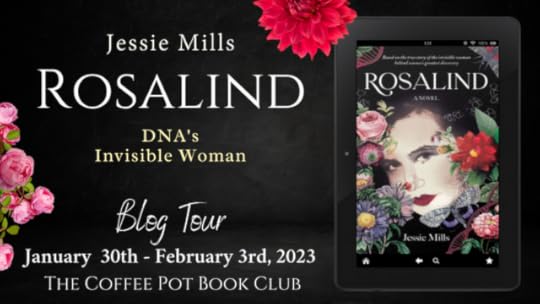
This week for #HistFicThursdays, I'm delighted to once again be teaming up with The Coffee Pot Book Club for author Jessie Mills' blog tour! Today, I'm sharing an excerpt from her debut release, Rosalind: DNA's Invisible Woman!
First of all, let's meet the book...
'A luminous, pin-sharp portrait of a true trailblazer. Mills's writing simply glows.' Zoë Howe, Author, Artist and RLF Writing Fellow at Newnham College, University of Cambridge
Rosalind: DNA’s Invisible Woman tells the true story of the woman who discovered the structure of DNA, whose work was co-opted by three men who won a Nobel prize for the discovery.
Her story is one of hope, perseverance, love and betrayal.
Driven by her faith in science, Rosalind Franklin persisted with her education in the face of formidable obstacles, including the de-reservation of women from war science.
In Norway at the start of World War II, her place at Cambridge's first women's college was thrown into jeopardy.
A decade later, she fled Paris upon the news that the research director at the State Chemicals Lab was having an affair. They continued to write to each other in secret.
Rosalind knew when embarking on science, a gentleman's profession, that the odds would be stacked against a woman's success. But she did not foresee that her pay would later be cut on account of her age and gender, that she would be burned by the plagiarism rife among her male contemporaries or face her own battle with cancer.
When she took a research post at King’s College London, the head of the physics department switched her subject to DNA at the last minute.
She was tasked with discovering its structure using X-ray crystallography. Could she become the first scientist to map the DNA molecule and would the discovery ultimately be worth it?
When two researchers at Cambridge University, her alma mater, built a three-chain model of DNA weeks after seeing her lecture, she knew that it was wrong.
Scientists at each of the three labs competing in the race to find DNA’s structure had guessed that the molecule had three chains. Her evidence proved them wrong. But would anybody listen?
This is the story of DNA that you won't find in the history books...
The woman behind science's greatest discovery has been variously referred to as 'an obsessive woman', 'difficult', and 'the dark lady of DNA'. Why was she called these names, and were they justified?
Written by journalist and former Wall Street Journal (PRO) editor Jessica Mills Davies, following nearly three years of intensive archival research, the novel aims to give Rosalind Franklin a voice for the first time in history. Her story is the most well-documented account of 'the Matilda effect' and its corollary 'the Matthew Effect', whereby women's contributions to science and other professions are often ignored or misappropriated.
The Exeter Novel Prize-longlisted novel is peppered with copies of original correspondence between her and her contemporaries, illustrating how three men got away with the biggest heist in scientific history.
You can buy Rosalind: DNA's Invisible Woman via this Universal Link
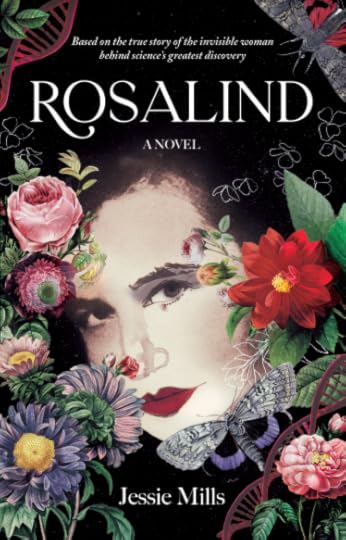
And here's an excerpt to whet your appetite:The chance of making a major scientific discovery is minuscule. Nearly half are by accident. Serendipity, or mishap by another name, pulls scientists from the clutches of flat Earths and illusory sirens. Controlled experiments frame those fallacies and rescript the world’s truths. At King’s College London, we were specks of dust in the gargantuan cosmos, investigating the very secrets of life. Progress was not a lightning-bolt moment, it was hours of toil, in a basement that smelled of mothballs. If you had asked me then if I knew we would find the structure of DNA, I would have said, simply, that the data speaks for itself. Its voice is audible for those who listen.
The mysteries of the universe reside in the simplest of shapes. The twisted loop of a figure of eight was visible in my X-ray photographs. Two strands of the genetic code entwined together beneath the glass, intersected at the centre, and flecked with atomic dots. I traced their smooth lines, back and forth, back, eight, back. The meandering curve of the infinity sign hides an eternity of secrets.
Rosalind Franklin
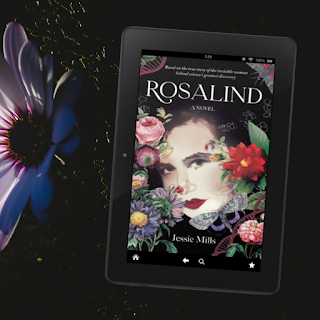 London, January 1951
London, January 1951
The noticeboard is empty except for a couple of brass drawing pins. The shiny tacks are clustered together like constellations. Each star has a lifespan of its own in the amaranthine universe, which always ends the same way, with those isolated stars coming together again into the collective mass of things. Maybe that’s the definition of infinity, a constant loop of time, polarisation and unity, with fragments of matter dispersing and going their separate way, before rejoining and recreating, only to begin again. It’s the one concept so near to God that no man has answered it.
Could the universe be forever folding in on itself, like the infinity sign, in never-ending fractals, such as the shoots of a leaf, or patterns on ice, expanding and shrinking, throughout time and space? The Einsteins raised the possibility. Like a star, the universe may shine most brightly before it collapses, folding back in on itself and everything around it, expanding before retracting once more, in infinite iterations.
What is certain is that the world is faster to turn than many of the individuals in it.
There are few other places to go, in the university, except for the chapel. The common room is reserved only for the men. Their bluster pours out into the corridor, where they can be heard posturing about politics and sport, or ‘feminine charms’. Such locker-room talk was rife in Cambridge. There was more discretion around intimate encounters and nighttime liaisons in Paris, where I have returned from four years working in France’s State Chemicals Lab.
There, silence could save you.
On my first day in the lab in London, a thick fog descends on the rooftops north of Temple station. It’s been nearly a decade since I left Cambridge’s first all women’s college to get a job in Industry. Snowflakes float on the breeze, and the gravestone paving is slippery with ice. William Waldorf’s gothic mansion, just up from Temple, blends into obscurity on the backstreets. A few yards away, the gateway to the university is visible through the mist. Once it was an inlet for merchant boats on the River Thames. Now it serves as a back-entrance for King’s College London. The throng of the Strand has moved, by necessity, from the river to the road.
Romanesque colonnades are perched incongruously on top of the arch, which plumbs the recesses below ground level. The gate doesn’t serve a purpose anymore, except as a curiosity. On the other side of the archway there is a quadrant of buildings, standing proud like tombstones, yet more vessels to entomb the history of progress.
‘Have faith, Rosalind,’ my father said to me as I was leaving home that morning, where I have moved back to live with my parents.
The Christian college of University College London isn’t where he expected me to work. The religious fervour has grown in him since helping my eldest brother David learn the Torah for his Bar Mitzvah two decades ago.
‘I’ve got plenty of faith, in science, Dad. Please, let me get on, or I’ll be late.’
You don’t need to be religious to have faith, because faith is just a kind of hope but one that you believe in, instead of wish for. It has the power to knit together the disparate parts of a broken heart or to achieve the unthinkable. That sort of faith doesn’t have to be in God, it could be in a person, or in yourself.
I chose to put my faith in science.
Now, let's meet the author:
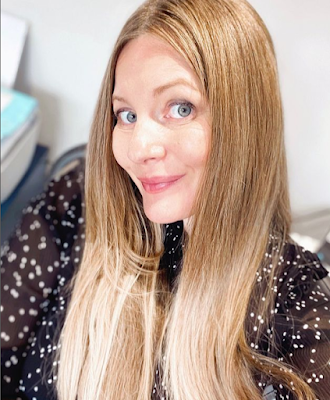 Jessica is a journalist and author. She has written for publications such as The Independent, The Wall Street Journal and Business Insider, where she investigated the use of flammable cladding in hospital intensive care units in 2020.
Jessica is a journalist and author. She has written for publications such as The Independent, The Wall Street Journal and Business Insider, where she investigated the use of flammable cladding in hospital intensive care units in 2020.Before that she was a member of the steering committee for Women at Dow Jones, where she spent several years as an editor and led the team that uncovered the misuse of funds at Abraaj.
Her debut novel tells the true story of Rosalind Franklin, the invisible woman behind the discovery of DNA’s double helix. It was longlisted for the Exeter Novel Prize 2020.
You can find Jessie on these links:Website - Twitter - - LinkedIn - Instagram - Amazon - Goodreads - Pinterest
To follow the rest of the Rosalind: DNA's Invisible Woman tour, click on the banner below:
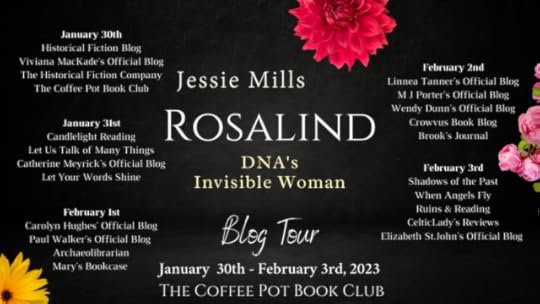
January 29, 2023
#TheRabbitHoleReadingChallenge Book Review: The Woman in Silk
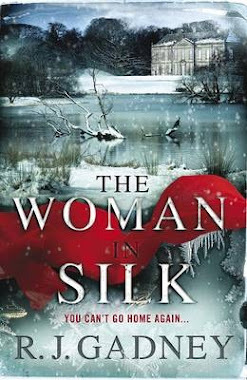

Review
I feel slightly bad writing this review because I googled the author, Reg Gadney, and discovered that he died in 2018. He seems to have been a very interesting person, who created many great things throughout a very creative and fruitful lifetime.
Unfortunately, this book isn't one of those things.
There are two things I really loved about it. The first is the blurb, which is shared at the end of this review. This is a book which sounds perfect for me, and I'm still looking forward to reading the story that I believed it would be.
The second is the personal inscription which is in my copy. You see, someone who knows me really well also read the blurb and immediately thought of me! What could possibly go wrong?!
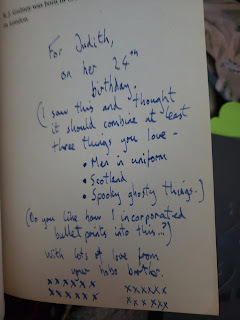
It turns out that a book can look perfect for someone but still not be a good fit. But, honestly, this is just not a good book.
There are one or two characters who threaten to be realistic but every single one of them maintains an air of unlikability, so you don't particularly care what happens to any of them. We have Hal, the absolute idiot who, despite the fact that he's aware of how weird his mother's nurses are, never bothers to move into Carlisle until the Christmas is over (despite the author's heavy-handed attempts to make it clear how very wealthy he is). There's the nurses themselves, possibly witches, possibly religious extremists, possibly adult pantomime villains who you want to boo and hiss at at various times throughout the book. You also have Sumiko (the woman Hal's having an affair with, professes to be in love with, then promptly forgets about) whose young daughter experiences a horrific trauma and yet who finds almost immediate solace by Cooking For Her Man. Yeuch!Finally, there are various named villagers, who are all so two-dimensional that it's a wonder they're not found blowing like kites around the freezing English countryside.
The plot is bizarre too. Other reviewers have mentioned that it doesn't know whether it's horror or a thriller, and that's a big identity crisis which runs through the book. I actually found myself laughing as it got towards the end, when it suddenly jerks way off piste and you're faced with a very different kind of story to the one you've painstakingly read through for the past 78 chapters.
Finally, disappointingly for Gothic fiction, the shock-and-gore value of this book is far greater than the writing quality. I looked to be scared but never got any further than being repulsed or, more precisely, ick-ed. The book would have benefited significantly from some heavier editing. Discovering that the author was also a screenwriter explains their obsession with pages and pages of speech, but an editor ought to have put a stop to that.
To summarise, I cannot think of a single thing to recommend this book, but please let me know if you ever choose to write the story which is on the blurb because I'm still waiting to read it.
Blurb
Captain Hal Stirling is flown to England from Afghanistan after a roadside bomb renders him battered and broken.
Once home, he retreats to his ancestral family seat of Stirling Towers - a gothic mansion that dominates the landscape near the remote Scottish Borders - for a Christmas of quiet recuperation. But on arrival he discovers that his mother, a fanatical spiritualist, has died and been hastily buried.
Isolated from the insular local community, Hal finds himself at the mercy of his mother's two mysterious nurses, the harshest winter on record and, before long, the horrific visions; experiences he attributes to his heavy medication. Yet as the December weather deteriorates, so does Hal's certainty that his home is a place of safety.
Who, or what, is trying to frighten him to death?
January 26, 2023
Lilies on the Deathbed of Étaín by Oisín Breen - A @WeeklyScribe Guest Interview
Read on, poetry-lovers...
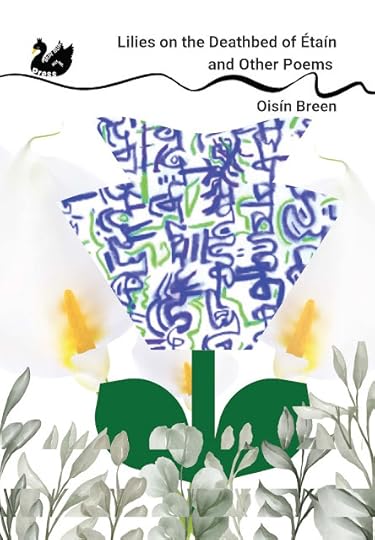
Please introduce yourself and your book.
Thank you. Well, in purely declarative terms, I’m an Irishman, the sound, meaning, history and myth of my country is in the bones, so when it comes to the poetic, I am precisely the opposite of what in my own brain I call the ‘English’ style, though to be fair it stretches over the oceans, too, namely a cool, crisp, reserved, dry, acerbic, minimalist approach to writing. I’m no minimalist whatsoever. Lord, I don’t even believe in it. A poem or a story without a journey, without arc (I mean if you think of the theorist Todorov and minimal narratives, how can you not think of waves?), without music, without that, yeah it can be excellent, and for some it’s the correct way to write, especially based on a honed craft, but the idea that it is essential, or generally ‘right’, smacks of the same horrific attitude that seems to imply that people who sleep seven hours a day between 9pm and 4am are somehow superior to people who sleep seven hours a day between 2am and 9am… There’s a strange prudishness to the minimalist that is shared by the morning person. So, yes, one part of who I am is someone who believes that how one gets somewhere is just as important as the actual getting there (although, until planes, and society more generally revisits the whole build things for people between 5’3 and 5’7 thing, certain parts of ‘travel’ remain quite frustrating as a 6’3 man – odious architects! -- actually, so does even soup eating, default table size standards ensure to punish us with a far larger distance twixt spoon and mouth for our brains to navigate (pity more the giants, and I’m thinking of one in particular)) …
Beyond the prattle on minimalism, I suppose there are other declarative things I ought to explain about myself. I’m 37, though I’ve been convinced all year I’m 38. I’m born, bred, raised in Dublin, although I live in Edinburgh at present, while completing a part time PhD (narratology), I’m a poet, I’m a financial journalist, I snuggle often with Hessell, a very sweet and gentle rabbit, with an air of mischief, I’m lucky to be known and liked, and to know and love, a beautiful lady...
I’m, quite naturally, one for books, partial to long walks (just flat, no giant up-hill defeat nature attitudes, here, I have no urge to conquer nature whatsoever), endless chatting, jazz, classical… a deep believer in the value of friendship … all that.
More important, however, is the book, Lilies on the Deathbed of Étaín, which is my second full collection, this time with Beir Bua Press, a small wee Irish press that’s getting an ever growing reputation for plucking excellent picks out of the air, so hat is always tipped to Michelle.
My first collection, the very well received Flowers, All Sorts in Blossom, Figs, Berries, and Fruits Forgotten, was the first since the return of Hybrid Press, under the Dreich/HybridDreich moniker, thanks to Jack Caradoc, so again, hat tipped there.
In literal terms, this new book, Lilies, is a collection of two long-form poems, and four medium-length works, all pulled together, as best I thought possible, to fit the ‘Beir Bua’ MO.
But again, perhaps highlighting my belief that ‘literal terms’ aren’t always the most accurate way of thinking, all that really tells you is that there’s a lot of paper, a lot of ink, and a certain nod to the realities of publishing. It could be the synopsis to an art house interpretation of a Jimmy Stewart movie.
More accurate is to say that Lilies is a collection of six works, two of which are long-form, through which I do my best to honour a combination of friendship, kinship, musicality, motherlove/fatherlove/love/kinlove, fear, doubt, loss, the myth and magic that still bubbles in all but the most prosaic of us … and ach …
But of the pieces themselves … one (the second) speaks, or at least I hope speaks, to the way in which we can be totally all encompassing swallowed as a spirit, soul, and flesh by love, how it can inch into every pore and swallow us up, beautifully, sadly, horrifically, and, also joyously. It’s certainly one of the most musical pieces I’ve ever written, and if you pick up the book, you’ll see why!
The first long poem in the work was inspired by my oldest friend’s sad sad loss of his mother several years ago. He stood so proudly and strongly at the funeral. Rock solid, fun, sweet, laughing, joking, being wise, being attentive… ach, he truly did a superb job, and she would have been hugely proud looking on… but, at the committal, when the curtain fell, I saw him split into two. One word leapt to my face: ‘godstruck’, and in the end that look, that knowing, that soulfulness prove the spark that drove ‘Lilies’ the poem. Thankfully he loves the work, or I’d have been in hot water. The piece itself then blends that concept, and motherloss, and the sexuality of a young woman and her courtier – something we often forget of mothers and fathers – and then it all seemed to naturally weave into the Irish myth cycle of Todchmarc Etine.
The latter four works, I’ll leave as a surprise, though I have spoken on them a tad before.
To return to a summation… The book is its own thing. I tried to put all the craft I could, at the time of writing it, into it. I don’t believe in the idea that a book should be ‘authentic’, hell, I mainly believe we’re a host of multiplicities all convening to create temporal composites of interactive ‘identities’ that coalesce and diverge, so I’m pretty sure there’s no such thing as authentic at all. But I find the strange obsession in modern writing to believe authenticity is key, to be utterly daft. That which is real is, also, ironically, also far better expressed through magic, exaggeration, play, music… than it is in recapitulation and the banality of our own singularity when put up against the universe.
The book, narrated (in one interpretation) by Ailil Angubae, but with a superpower (I’m reckoning no one will figure that bit out), is, ultimately, if you’re on the side of Frege (‘Über Sinn und Bedeutung’), an opera.
The book, if you’re more on the Russell side of the whole connotation/denotation shift, then Lilies on the Deathbed of Étaín is 52 pages (plus covers), paperback bound -- weighing extra, due to indentations of ink -- which contains words that mean things, depending on context, that, if you appreciate the musical in poetry, you will enjoy.
From where do you draw your inspiration? Does it vary for different poems?
Woof… right, this is one of those simple, not simple, simple questions isn’t it?
So the first part of this question is the implicit, do I believe in the ‘inspired poet’, who writes like a flight of fancy, the whole Victorian myth of association, or Plato and the ‘light and winged thing’ (albeit with no voting), the Coleridge infinite ‘IAM’; or, conversely, do I come down on the Stephen King (all aspiring writers should read his On writing though) hammer, hammer, hammer out those words way of things…
The inspired poet? Nah, the very idea that a person can only write when they have the ‘moment’ shows a distinct unwillingness on behalf of that person to cultivate craft, and I’d bet money they don’t like editing, editors, collaboration, and have a thinnish skin (so they hit an early break if they’re actually publishing). That said, do poets get inspired, Christ yes. There’s a million times you can just go oh, and there it is, and hopefully you have enough autonomy in the day in question to grab that poem by the horns and wrestle it/caress it into fruition. Poets should, I think, also work to allow themselves to develop a way of thinking, and living, and doing, that suits giving themselves opportunity to be inspired. Indeed, part of my attitude on ‘the inspired poet’ is just that. Without work, the inspiration will falter, it’s just thermodynamics… There’s only so much that you can create without connection.
But, equally, the whole hammer and tongs, hell for leather, go go go go… yeah I don’t believe in that either. Mainly because quality suffers. Some people find it helpful, some don’t, but half of what you’ll do is waste time on busywork. Like with most things, it comes down to mentality. Personally, I much prefer spending more time traipsing, pottering, thinking, musing, mulling, then getting my hands dirty.
So, perhaps, on this, I’m a bonafide fence sitter.
I think I’m okay with that.
As for more general inspiration, hmmm… probably a simple mixture of observation (both internal and external), and research. If you don’t find inspiration in what you see, smell, touch, hear, remember, feel, think over, rethink, rethink twice, re-experience and experience… Well, you’re not a poet, you’re also probably living in some kind of sensory deprivation nightmare. But, I think a lot of writers also miss a trick in research. One poem in this new book deals with the tragedy of mass puffin die-offs, another with the difficulty ducks face in rearing their young… I’d thought of the two things, and felt for the two things, but then, equally, I dug in, did my research, learned a lot about these things, and then wrote, an informed, and I think developed, piece; whereas, say, 15 years ago I’d have found that something I just couldn’t fathom doing. So yeah, research and thoroughness to detail is a wonder, but that has to blend with observation and experience. Hell, in my current WIP, I went as far as finding out the exact closest bar to a location I needed, the exact physical distance between the location of the poem’s protagonist and the bar, the bar’s founding date, what type of wood its actual bar is made of, and what’s typically kept behind the bar. Why? It felt right.
Lastly, on that sort of thing, I should say, however, that once one has that level of depth, none of it is sacrosanct. I believe poetry, and art in general, has no duty to (or benefit from) plain truth. That’s not to say that it can’t be true, but that truth is not a prerequisite to art. There is absolutely no need for authenticity to impact quality. If the bar, say, is mahogany, but that doesn’t fit the vision, or the word-flow, it changes… If the reality is that at one time I leaned in and… or that I didn’t. It’s irrelevant. The master of a poet, for me, is the poem, not the truth, and the soul of the piece in progress is the biggest inspiration.
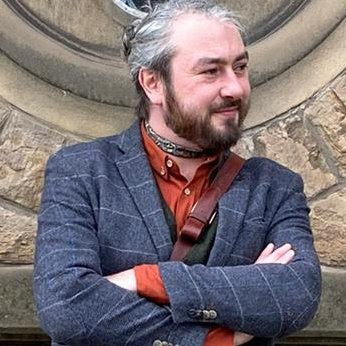
Do you work with music? Have you every considered your poems leaving the page and becoming song lyrics?
Oh, lord, hmm… generally no. I do like the sound of people talking in cafés, and I do a lot of my writing out and about in cafés and bars… But no, when I was more of a dilettante, yes I did, but now, no, I focus on the singularity ahead ;).
For prose, I often put on a bit of minimalist classical, so your Einaudis, Glasses and so on and so forth (there’s some great newer stuff in this genre, from Obel to Christl, and loads more, and some great well known stuff obviously that I didn’t mention)… but only for editing.
For poetry, and for journalism, I honestly can’t/couldn’t listen to music. For the journalism because the beats are sharp, fast, and different to song, and because it’s about clarity. For poetry, well that would make no sense, then my own music would be harder to hear. Poetry is music.
As to leaving the page and becoming song lyric? No, not at all.
I do love, as my lady, and many of my friends also do, freestyling and singing songs around the kitchen table. We set each other hard challenges… Most recently I had to sing a five minute piece about the emotional journey of an expensive bottle of sambuca bought 40 years ago but opened in late December, just before Christmas, perhaps on the 21st or 22nd…
I also really respect great songwriters, though I see a lot less of them in society today (I have zero respect for pop music, or pop culture or pop poetry (Rupi Kaur’s work should live only as a what not to do lesson)), but I do, perhaps vaguely controversially, but perhaps not, find it impossible to consider song lyrics to be poetry. Nor do I consider poetry to be tantamount to lyric.
They’re different forms. Sure, they communicate, and sure, at times there’s a deeper dialogue, but they’re different. Take Dylan, he’s one of the best (also entirely unwedded to authenticity) lyricists in history … Do I think Dylan is a poet? Absolutely not. I don’t think he deserved the Nobel at all, ‘as a poet’, as many seemed to argue he did. I have a sneaking suspicion, neither does he. That said, he’s sure worth his money as a Nobel-level songwriter. I just think he’s working in a different field, with a different approach. Still a sodding genius though. Love the man’s early/mid work.
I certainly couldn’t hack it writing doo-wop songs, or your general tearjerker indie/rock songs, I’d lose my mind in minutes.
Who (excluding yourself 😉), in your opinion, is the greatest poet of all time?
Impossible question to answer. Too many superb poets, take your pick from any of the ‘greats’, and we all know those lists, we might put them in different orders… there might be one or two I leave out and you don’t… I mean I don’t particularly rate ‘simple’ poetry, I’m also not actually a big fan of Plath, Bishop, or Dickinson, but would put Akhmatova, and, say Montale higher, for instance. Equally, my list would probably put Yeats, Heaney, Pound, Elliot, Ginsberg higher than many contemporary writers, and I’d probably push folk like O’Hara down (though he is great fun). I’d rate Coleridge above Wordsworth, Blake above Donne et al… But, more bluntly, I don’t believe there are ‘greatest’ X’s of all time, there are people who touch greatness, who achieve it, and they do it in their own indomitable way, with their own style, their own flair, and we’re just lucky to have the chance to appreciate all of them :)
What is the hardest thing about writing poetry?
Ensuring you have the time to write it, given the collapse in readership meaning you can’t actually make a living off being, say, a writer of short stories, poetry and the odd novel, unless you’re very very lucky, or very willing to be very very poor.
Also marketing, it’s not hard per sé, but it’s yet another example of how the mechanics of ‘democratization’ thanks to the web, well, how they actually suck. Lordy, to be a writer in the 50s… (yes I know really what I mean is to be a ‘male’ writer in the 50s, and I do really mean to be a ‘male’ writer in a wealthy nation from at least a lower middle class upbringing) … but a little bit of fantasy doesn’t go amiss … I’d love, as I’m sure we all would, to be simply expected to write things, then occasionally wheeled out here and there to say things while holding whiskey.
I should say, here, that I know how hard the above, too, is for small presses, for publishers in general nowadays… I’m sure, say, Michelle, or Jack, would absolutely love to have been able to spend six weeks focusing majoritively on a campaign to help their authors sell books, to include talks here and there, and presentations, and… but, like the rest of us, they have to hustle to do multiple things, earn bread, and then speak poetics, so hats tipped, hats off to the indies … One writes because one must, but the indie presses, they get a lot of grief, and not enough love, what they do is tough as nails (as it is for the journals like yourselves, too), and the only reward is in knowing one has helped something hopefully beautiful survive a little longer in the world.
What is the best thing about writing poetry?
Sorry to be glib, but enjoying words that succeed one and other in the best possible way.
What words of wisdom would you share with young poets who are just at the start of their journey?
Yikes. Uhm. Probably don’t do it. Don’t write the poem.
Because then, if they do, you know they’ve been warned.
It’s a love. It’s the artistic equivalent of deciding to live in an 11th C hovel in terms of remuneration, readership, and support. You do it because not doing it makes you feel crap and doing it makes you feel good.
But, beyond that, I’d say the earlier you can screw your sensibilities the better. Throw literal truth out the window, then a. focus on just making words that go after the previous words in the best way your demesne, and b. do not have any ‘counterculture’ attitudes to getting stuck in on marketing, talking, meeting, chatting, and recognizing the wonder in people’s difference. You don’t own your work, you do own how you inculcate it.
And finally: why is poetry (specifically your new collection) important in today’s world?
Hah, it probably isn’t.
I mean, naturally, I believe it is. I think poetry is essential. It does something no other media can do, and hence it exists.
Columns exist as one of the best ways to hold up a building.
Poems exist as the best way to express the ephemeral of the visitation of meaning beyond the literal, but rooted both in language and in sound.
Poems are music.
Poems are the only way words can do what music, partly, does, and they are the only medium where true equivocal sense, where connotation, meaning, play, all have literal foundations in a built world, but also have the interplay and connective power of song…
There is no more truthful medium than poetry, particularly because it eschews direct representation.
I can go on like this for hours.
Poetry matters, because it is itself, and it is a unique means of us, being humans, being human together, sharing together, interpreting reality together, finding and creating meaning, and, after all, meaning making is one of the things in the universe that matters most… We are storytellers, all, even if the sense is a bit flat in certain eras of the world.
Poetry matters, because it is fire, and it is important for fire to burn…
But again, I return to my first point, it also doesn’t matter.
Poetry matters if you choose to let it. If you choose to ascribe meaning, if you choose to let it do so, if you choose to believe that other humans matter, that connection matters… If you don’t, then … while we can get into an objectivist argument (and I probably ‘do’ believe poetry matters objectively … there’s little point to it.
As to my collection, why do I think it matters?
I think it matters in the sense that it’s a stonkingly fun read, that it is at times beautiful, that it is playful, musical, full of joy and love, and yeah, all the good stuff…
But I also think it matters because it is unusual. It is different.
I have very little respect for certain styles of contemporary work, which I find soulless, empty, artless, and derivative, and more often than not, tantamount (as I’ve said before) to stand-up without the jokes, mixed together with a 12-year olds diary still being peddled by a thirty year old who never let old wounds heal… This sort of stuff, I feel, is best left on the therapist’s couch, or on the rain-wet ground outside a comedy venue.
So art that engages in form, style, play, music, meaning, and fights against the strange obsession with ‘self’ that dominates many areas of poetry, or the strange obsession, equally frustrating, among other writers to witter in endless ‘poet voice’ … egads.
So, I’m not saying my work specifically matters alone in this, but I think the work of artists who refuse the strange swallowing consensus (a failed one if you look at sales/interest) of accessibility, simplicity… That work matters.
Poetry is supposed to fly… too often at the moment it lingers in the utterly banal and overly personal.
Does my work matter? As a real answer? No, of course it doesn’t. It matters to me, I believe it to be of high quality, and I think if you read it, that the work stands up to scrutiny, and creates beauty in your mind and body… But whether it matters or not is up for others to decide.
You can find Lilies on the Deathbed of Étaín and Other Poems here!
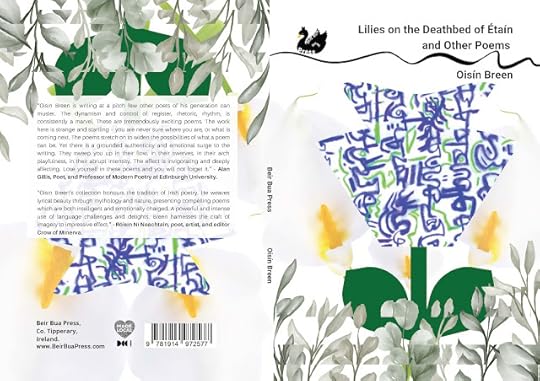
#HistFicThursdays - Ensign John Mackay (Caledon) - Fifteen Minutes of Fame
I'm running behind schedule today! But here is the #HistFicThursdays blog...
This year, I will be sharing a post every month which looks at a real person who appears in one of my books or who was an inspiration for it.
January's person is John Mackay.
Here's who he was:
John Mackay was an Ensign in the small militia which was based in the Northern Highlands during the 1745 Jacobite Rising. This was a little bit akin to being a freelance worker today. Because he was in the militia rather than the army, there is very little documentation to be found of him. The Book of Mackay has his deeds at Littleferry listed, and then he promptly disappears!
Events at Littleferry were swift and decisive, with Ensign Mackay winning the day against the Jacobite forces. Many of the men in the Jacobite ranks were Mackenzies, including their leader, the Earl of Cromartie. Many men were forced back into the sea at Littleferry and left to drown. Cromartie was later pardoned, but the other leaders were executed. John Mackay had led the attack for the government forces and, as a result, he was awarded £50 for having confronted the enemy and secured the Jacobite gold they had been carrying.
And then that's the end. The Book of Mackay has Ensign John Mackay listed as being from Moudale, a farmstead to the west of Altnahara, but it gives away next to nothing about what manner of man he was, nor what his peacetime occupation was.
Here's who he is in the book:
Ensign John Mackay is the man who sets James Og on his path towards becoming Caledon. Why? Because he is the threat James is fleeing from when he accidentally stumbles across his new purpose. Mackay has a deep-seated hatred of the Mackenzies, and he is determined to rid the Northern Highlands of the clan. In the first book, we don't find out where this hatred comes from, but he remains vehemently against the Clan of Caledon.
In The Stealth of Caledon, Mackay finds himself falling in and out with the Clan of Caledon, the phrase "an enemy of my enemy is my friend", best describes the mutual hatred and need which the two parties have for one another. Throughout the series, he continues to work for the Earls of Sutherland, often from Golspie and sometimes from Moudale, constantly looking for one-upmanship over the Mackenzies, both those of the name and those of the clan.
Here's what made him a great person to include:
Looking at a blank page when you're about to start a new novel is simultaneously exciting and nerve-wracking! To me, the characters (usually!) come first, and I knew I wanted James and his clan to have a worthy adversary. A quick exploration into the events immediately before James' sorry arrival at his uncle's house, showed Mackay as being a surprising victor. This made him perfect: an unlikely hero needed an unlikely antagonist!
The fact he played such a major role in these events but then disappeared meant that I could write his next chapter with comparative free reign. I could prolong his stay in Golspie, and build on his supposed hatred of the Mackenzie Clan. I could also toy with his relationships, and drop him seamlessly into the fantastical events of Caledon. He was known enough to be of importance, but overlooked enough to make him a pliable character.
And, because he's a real person, he was easy to make three-dimensional. The more the books unfurl, the more it becomes apparent that there is nothing evil about him - instead he is only very human. He is not a bad person for his adherence to duty, but rather a blinkered one.
So having fifteen minutes of fame is not a bad thing - it actually makes you a fascination to future historical fiction writers!
You can find Caledon here!
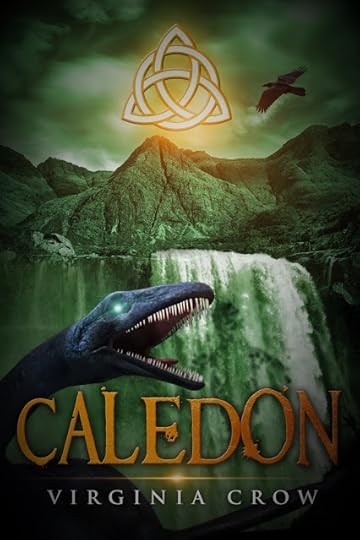
January 18, 2023
#HistFicThursdays - Pilot Who Knows the Water - N.L. Holmes - Guest Post
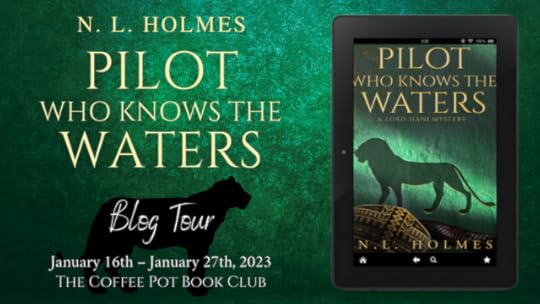 It's #HistFicThursdays again, and this week I'm delighted to be welcoming back N.L. Holmes as part of her Coffee Pot Book Club tour for the final instalment of The Lord Hani Mysteries. Find out about how she engaged with writing this book, and how it felt to complete her series, in the guest post below. But first - let's meet the book...
It's #HistFicThursdays again, and this week I'm delighted to be welcoming back N.L. Holmes as part of her Coffee Pot Book Club tour for the final instalment of The Lord Hani Mysteries. Find out about how she engaged with writing this book, and how it felt to complete her series, in the guest post below. But first - let's meet the book...Blurb
Hani must secretly obtain a Hittite bridegroom for Queen Meryet-amen, but Ay and the faction behind Prince Tut -ankh-aten are opposed -- to the point of violence. Does the death of an artisan have anything to do with Ay’s determination to see his grandson on the throne?Then, another death brings Egypt to the brink of war... Hani’s diplomatic skills will be pushed to the limit in this final book in The Lord Hani Mysteries.
Pilot Who Knows the Water is available via this Universal Link
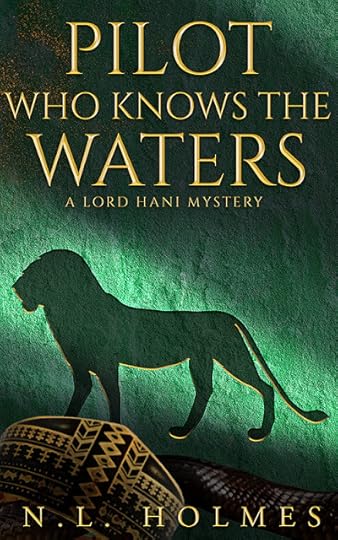
Guest Post
What was the hardest thing to research for this book?I think the hardest part of researching the background for this book was trying to sort out what must actually have been going on politically between the reigns of Akhenaten and his son Tutankhaten. We’re not even sure who was on the throne in that interim! Clearly, a big pushback to Akhenaten’s “reforms” was brewing, because they would all be blown away in a very few years, but was the reaction violent? In short, was there a civil war? And how much would that have impacted the ordinary person? The more research I did, the less clear it was, because scholars are by no means united on the answers! The sequence I have come up with seems increasingly to be accepted: namely, that Akhenaten’s brother (son? nephew?) Smenkhkara shared the throne with him but didn’t survive him. That Akhenaten’s wife Nefertiti succeeded him as king for a brief period. And only then did “Tut” come to the throne. Another related question is who was the “dakhamunza” who asked the Hittites for a prince to become her bridegroom, against all Egyptian tradition? We only have Hittite testimony of this; the Egyptians have obliterated it from their history. People used to take for granted that she was Ankhesenpaaten, the widow of Tut, thus putting the event some ten years after the interregnum. But, thanks to outside evidence like a solar eclipse, more and more scholars date this request before Tut. Thus, the likelihood that the king’s wife (in Hittite, dakhamunza) who approached Hatti for a bridegroom is either Nefertiti herself or her daughter Meryetaten, widow of Smenkhkara and formal wife first of her father, then of her mother. Confusing? You better believe it! Fortunately, I write fiction!
What are the pros and cons of writing a series rather than a stand-alone book?The good part about a series is that after the first book, you already have your characters formed and their relationships worked out. Their voices are clear in your head. You don’t have to redo all the research to create the basic world. Pilot was the sixth in a series, so I felt like I knew these people and their times well by that point. But of course, you can’t be sure that everyone who picks up the book and reads it will have read all the previous ones, at least not recently. Thus, there is a need to recapitulate, yet you don’t want to bore readers who are tunnelling through the books one after another with too much repetition. It’s a fine balance. New readers tell me that they were able to jump in without being lost, so perhaps I have succeeded. Then, in this case, which is the final instalment, I was writing a book that had to satisfy all the arcs that had carried on throughout six stories—personal stories that opened up in the course of the other five books that needed to be resolved here. That meant, too, that I had to keep track of everyone’s ages and the names of their children in a cast that had gotten bigger and bigger over the years. But that was only a matter of bookkeeping, so to speak.
How did it feel to complete this series? Do you think you’ll return to Ancient Egypt for more books? Why?It was a little sad to finish with the Lord Hani series, because I genuinely loved him and his family and their colourful, dangerous world. I think a lot of readers felt the same way. I had a commitment after that to do another story set in the Hittite Empire (The Players, which will begin appearing soon on Amazon’s Vella format), but Hani fans, rejoice! I’m working now on a spin-off series centred on Hani’s daughter Neferet, a physician in Thebes/Waset, who will carry on the family tradition of unravelling crimes. Hani himself will show up too. There is also a more practical reason for sticking with the Egyptian setting: a lot of readers are deep-dyed Egyptophiles, whereas the Hittites don’t have such a devoted lobby!
Now, let's meet the author:
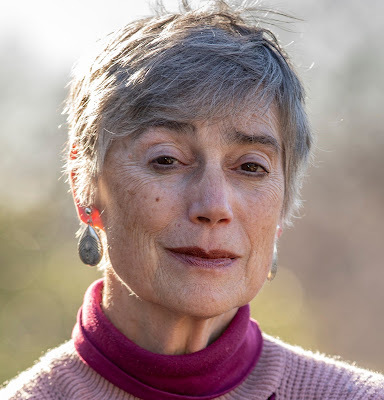 N.L. Holmes is the pen name of a professional archaeologist who received her doctorate from Bryn Mawr College. She has excavated in Greece and in Israel and taught ancient history and humanities at the university level for many years. She has always had a passion for books, and in childhood, she and her cousin (also a writer today) used to write stories for fun.Today, she and her husbandlive in France with their chickens and cats, where she weaves, plays the violin, gardens, and dances.
N.L. Holmes is the pen name of a professional archaeologist who received her doctorate from Bryn Mawr College. She has excavated in Greece and in Israel and taught ancient history and humanities at the university level for many years. She has always had a passion for books, and in childhood, she and her cousin (also a writer today) used to write stories for fun.Today, she and her husbandlive in France with their chickens and cats, where she weaves, plays the violin, gardens, and dances.You can follow N.L. Holmes on these links:Website - Twitter - Facebook - LinkedIn - Instagram - Pinterest - BookBub - Amazon Author Page - Goodreads
Keep up with the rest of the Pilot Who Knows the Water tour stops by clicking on the banner below:
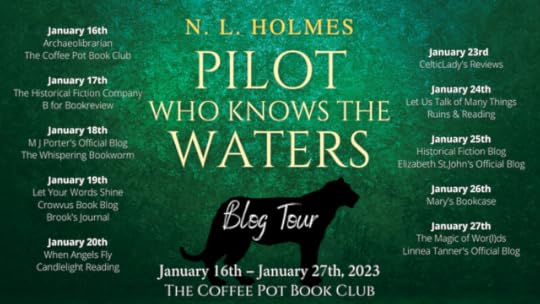
January 11, 2023
#HistFicThursdays - The Captain's Woman - Holly Bush - Book Excerpt
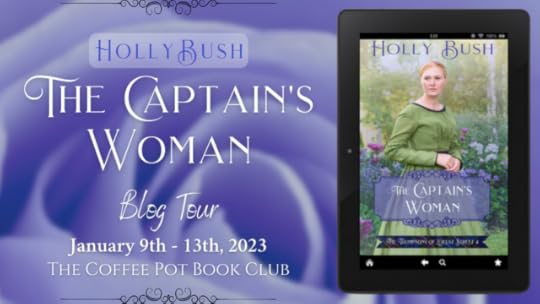
This week for #HistFicThursdays, I'm delighted to once again be teaming up with The Coffee Pot Book Club for author Holly Bush's blog tour! Today, I'm sharing an excerpt from her new release, The Captain's Woman!
First of all, let's meet the book...
Meet the Thompsons of Locust Street, an unconventional family taking Philadelphia high society by storm…
1870 ~ Muireall Thompson has taken her duties seriously since her parents died on the family’s crossing from Scotland to America in 1854. As the eldest sibling, their death made her responsible for her family and left little time for a life of her own. But now her brothers and sisters are adults; even the youngest is nearly ready to face the world on his own. What will she do when she is alone, other than care for an elderly aunt and volunteer at the Sisters of Charity orphanage? Has the chance for a husband and children of her own passed her by?
Widower Anthony Marcus, formerly a captain in the Union Army, is a man scraping the bottom of his dignity and hanging on to his honor by the barest thread. Reduced to doing odd jobs to keep a roof over his dear daughter Ann’s head, he often leaves her with the Sisters of Charity while he is out seeking steady work with a decent salary that will allow him to move from their single-room living quarters.
After an initial meeting that finds Muireall and Anthony at odds, a tentative friendship forms as they bond over their mutual affection for Ann. As friendship leads to passion, can a wealthy spinster and a poor soldier overcome their differences in station to forge a future together? Just as Muireall finds the courage to reach for her own happiness, Anthony’s past rises up between them and an old enemy reemerges to bring the Thompson family down once and for all. Will the divide between them be insurmountable, or can they put aside pride and doubt for a love worth fighting for?
You can buy The Captain's Woman via this Universal Link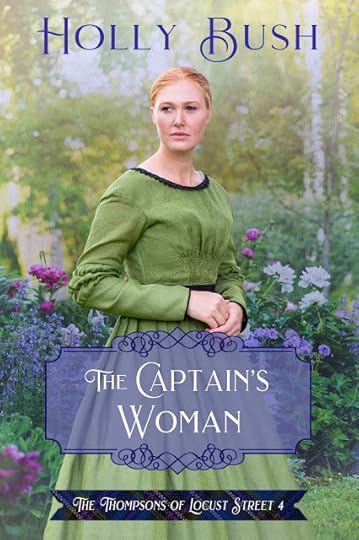
And here's an excerpt to whet your appetite:“I missed you too, Papa, and I have so much to tell you.” She said pushed herself down to stand on the snowy stone walkway in front of the orphanage and turned to Muireall. “Thank you so much for allowing me to stay with you. It was great fun.”
Muireall knelt down, and Ann rushed forward to be embraced. “I can’t remember when I’ve enjoyed myself quite so much, dear.”
It was a solitary moment for Muireall, even holding Ann in her arms and kissing the child’s hair. There was something defining about the emptiness she felt when her arms closed around the child. She’d always been certain that raising her siblings, guarding her family and their connection to Scotland and its fortunes were all she ever needed or wanted. But as the child’s fingers touched her neck above her cloak, she knew with clarity that she’d been fooling herself for years. She’d suspected as much as her siblings began to marry and begin families of their own, families of which she was on the periphery rather than at the center. And she knew there was something missing in her life. Something tangible and genuine that went to the heart of her. She closed her eyes for a brief moment to regain her composure.
Ann pulled out of her arms when the door to the orphanage opened and young Sister Ann Marie called to her to come in out of the cold. Muireall stood and faced Mr. Marcus.
“I hope she was not too much trouble,” he said.
“She could never be trouble, sir. Never,” she said with more emphasis than was necessary.
He stood military straight, feet spread although listing to his side with the cane, his free arm folded behind his back. “I am very grateful for her to have someone fuss over her, especially . . . a woman. She misses that, I believe.”
“You’re a widower?”
“I am. My wife left us and died in a carriage accident not long after. My sister came around and always made much of Ann when we lived in New York, but she remarried and moved south with her new family.”
“So it is just you and Ann.”
“Yes.”
“I’m sorry about your wife’s death, Mr. Marcus.”
“Don’t be,” he said gruffly. “She’s not deserving of it.”
“I see.”
“I doubt that you can, Miss Thompson,” he said with an unfriendly smile. “I highly doubt it.”
Muireall stared at him for several uncomfortable moments before turning to the carriage. “Mrs. McClintok sent something for your and Ann’s lunch. Do not give me that look, sir. She thought that since you were busy looking for work, you mayn’t have time to prepare a noon meal.”
“Or perhaps there’s nothing in my pantry.”
“Perhaps, but that is not my or Mrs. McClintok’s knowledge or business.”
He picked up a bag from the ground beside him, handed it to her, and took the canvas bag. “Mrs. McClintok sent coffee with cream in a jar that I warmed on the stove and had with my bread pudding. It was a treat. I’m sure Ann had some last night. I’m returning the jar.”
“She did have some—two portions, in fact,” she said with a trace of a smile. “She enjoyed it very much.”
He chuckled then. “I’m sure she did.”
Muireall turned to Mr. Bauer. “Would you please plan on picking me up around two, Mr. Bauer?”
“Yes, ma’am.” He nodded, then called out to the horses and began down the street.
“I’ll be taking Ann to our rooms now,” Mr. Marcus said, “but she’ll have to return after lunch. Mr. Endernoff, who I interviewed with yesterday, has sent a note round asking me to come to his office at one today.”
“Oh, that could be good news, couldn’t it? Would he call you to come see him again if he weren’t offering you the job?”
“The same thought occurred to me, but I try and not let myself hope too much. It’s been a long spell since I’ve had steady employment, and I’ve talked to many men about jobs they were offering, but nothing has come of it.”
“You don’t want to be disappointed.”
He shook his head. “No, I don’t. There is only so much disappointment one can take until one becomes bitter. Ann does not need her father, her only parent, to be bitter.”
“She does not. She is very, very lucky to have you, though.”
Now, let's meet the author:
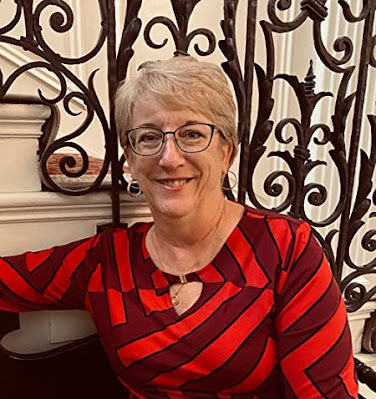 Holly Bush writes historical romance set in the U.S.in the late 1800’s, in Victorian England, and an occasional Women’s Fiction title. Her books are described as emotional, with heartfelt, sexy romance. She makes her home with her husband in Lancaster County, Pennsylvania. Connect with Holly at www.hollybushbooks.com and on Twitter @hollybushbooks and on Facebook at Holly Bush.
Holly Bush writes historical romance set in the U.S.in the late 1800’s, in Victorian England, and an occasional Women’s Fiction title. Her books are described as emotional, with heartfelt, sexy romance. She makes her home with her husband in Lancaster County, Pennsylvania. Connect with Holly at www.hollybushbooks.com and on Twitter @hollybushbooks and on Facebook at Holly Bush.You can find Holly on these links:Website - Twitter - Facebook - BookBub - Amazon - Goodreads
To follow the rest of The Captain's Woman tour, click on the banner below:
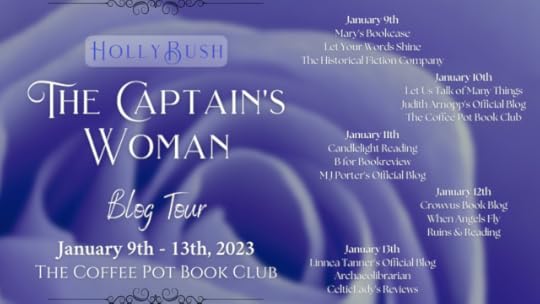
January 4, 2023
#HistFicThursdays - Sisters of Castle Leod - Elizabeth Hutchison Bernard - Guest Post
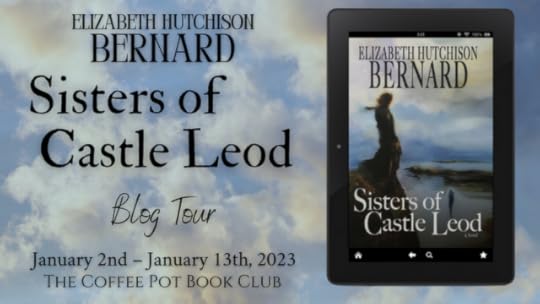
Happy New Year, Readers!
For the first #HistFicThursdays blog of 2023, I'm delighted to be sharing a guest post from Elizabeth Hutchison Bernard as part of her Coffee Pot Book Club tour for her book Sisters of Castle Leod. There is no history more enticing for me than the history of my local area, and I was delighted to discover that Elizabeth's book is not only set in the Highlands, but centres of the Mackenzies! Her guest post explores the Ghosts, Spirits, and Legends of the area which impacts on her book, but first here's the blurb to whet your appetite...
Blurb
**Finalist in the 2022 American Writing Awards**
Millions are fans of Diana Gabaldon’s popular Outlander books and television series, but few know that Gabaldon’s fictional Castle Leoch was inspired by a real Scottish castle, Castle Leod. The two sisters who lived there at the turn of the twentieth century were among the most fascinating and talked-about women of their era.
Lady Sibell Mackenzie is a spiritualist, a believer in reincarnation, and a popular author of mystical romances. Petite and proper, she values tradition and duty. Her younger sister Lady Constance, swimming champion and big game hunter, is a statuesque beauty who scandalizes British society with her public displays of Greek-style barefoot dancing. The differences between the sisters escalate into conflict after Sibell inherits their late father’s vast estates and the title 3rd Countess of Cromartie. But it is the birth of Sibell’s daughter that sets in motion a series of bizarre and tragic events, pitting sister against sister and propelling Sibell on a desperate mission to challenge the power of fate.
Sisters of Castle Leod, by award-winning author Elizabeth Hutchison Bernard, is the emotionally charged story of two sisters torn apart by jealousy and superstition, and the impossible leap of faith that could finally bring them together.
Sisters of Castle Leod is available via this Universal Link
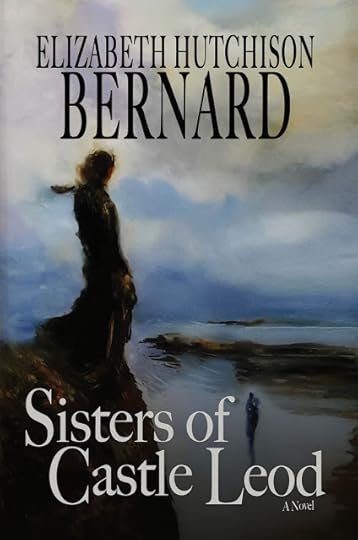
Guest Post
GHOSTS, SPIRITS, and LEGENDS IN SISTERS OF CASTLE LEOD: A NOVEL
Thanks so much for inviting me to talk about my new historical novel, SISTERS OF CASTLE LEOD. My research for this book was a great excuse for me to travel again to Scotland. I had been to Edinburgh and the surrounding areas, but never to the Highlands. Castle Leod is located in Strathpeffer, not far from Inverness, and I had the pleasure of a personal tour by its current resident, the 5th Earl of Cromartie. We talked about his grandmother, Sibell Mackenzie, 3rd Countess of Cromartie, who is the narrator of my novel. It was the earl who told me that his grandmother, a spiritualist and romantic novelist, experienced many sightings of the castle’s resident ghost, the Night Watchman. The earl confirmed that he, too, has witnessed the ghostly form of a 15th century sentry.
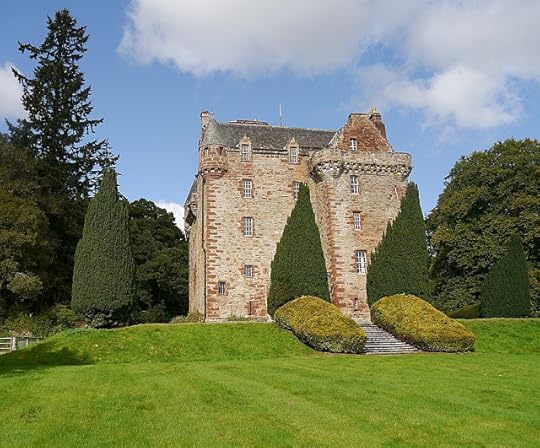 Castle Leod photo courtesy of Craig Wallace
Castle Leod photo courtesy of Craig WallaceUnfortunately, I didn’t have the opportunity to try my luck at a ghost sighting, but I did make a side trip to London to further explore of the psychic realm, which was key to Sibell Mackenzie’s life and character. The earl shared that his grandmother was, for a short time, president of the Spiritualist Association of Great Britain (SAGB). I could find no official documentation of this, but there were many such societies in the early Edwardian period with similar names, so it is entirely possible that her involvement was with SAGB or another such group. I was excited about the possibility of communication with Sibell through a psychic, thinking that perhaps she might have some advice for me about the writing of my novel. So, while visiting the SAGB, I met with several psychics who tried to contact the departed countess. Though I came to the conclusion that bringing solace to grieving relatives may be what they do best, I found the experience informative.
Before traveling to the Highlands and London, I had already done extensive research on the history of British spiritualism, a fascinating chapter in our eternal search for answers about life and death, physical versus spiritual phenomena, and how religious beliefs and scientific inquiry can, or cannot, coexist. When I returned from my travels, I spent three years working on the book, including further research into the lives of my main characters, Sibell and Constance Mackenzie. Of course, when writing historical fiction, the research never really ends! There is always something additional, or unexpected, that requires delving into.
Among the most important resources for this particular novel were the bountiful newspaper archives. The Mackenzie sisters were favorites of the popular press. It is easy to see why. Sibell was a pretty, young countess and one of the wealthiest landowners in Scotland, later becoming a prolific writer of mystical romance novels that achieved wide popularity. But Constance was even more the focus of media attention, first for her impressive accomplishments as a sportswoman and, eventually, for a string of scandalous exploits that included public performances of Isadora-style barefoot dancing in the theaters of London, Paris, and New York—something quite shocking for a noblewoman, which is why Constance thereafter found herself banned from court society by King Edward himself. While Sibell’s sense of duty was an overriding force in her life, Constance was a committed free spirit. But that is only one part of the conflict between the sisters that drives the plot of my novel.
The folklore of the Highlands was an important aspect of my research and one of the things that attracted me to the sisters’ story. Here is an authentic newspaper snippet that led my plot in a surprising and rather spooky direction (for this preview, I’ve redacted any “spoilers”):
Lady Constance Mackenzie is sister and heir presumptive to the Countess of Cromartie, who also holds the titles Viscountess Tarbat, Baroness Castlehaven, and Baroness MacLeod. Lady Constance’s succession to all these titles, as well as the large family estates, depends upon the fulfillment of an old family legend whose truth in part has been demonstrated already, in a manner to arouse the awe of the superstitious, by a family tragedy that occurred last December. … [the legend states that] when a certain stream on the estates should be turned from its course, the succession would pass from the direct line. Only a few weeks before the [tragedy occurred], in making alterations on the estates, the course of the stream had been changed.
How exciting it was to discover this little-known piece of the historical record and such a delicious tidbit to feed a fiction writer’s imagination!
Many readers especially enjoy historical fiction based on real people and events. Do you, and, if so, why?
Now, let's meet the author:
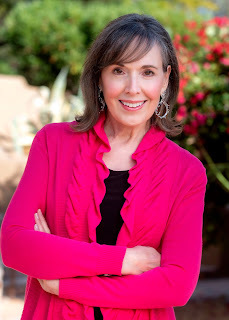 A former touring musician/songwriter and public relations professional, Elizabeth Hutchison Bernard is the author of two Amazon bestsellers: THE BEAUTY DOCTOR, "a compelling historical novel steeped in mystery with strong elements of a medical thriller" (Readers' Favorite, 5 stars), and TEMPTATION RAG: A NOVEL, a "resonant novel ... about the birth and demise of ragtime ... luxuriously crafted" (Publishers Weekly). Her books have been finalists for the Eric Hoffer Book Award, National Indie Excellence Awards, and Arizona Literary Contest; they have received 5-star ratings from Readers” Favorite, Book Readers Appreciation Group, and historical fiction Discovered Diamonds. Elizabeth and her family live near Phoenix, Arizona.
A former touring musician/songwriter and public relations professional, Elizabeth Hutchison Bernard is the author of two Amazon bestsellers: THE BEAUTY DOCTOR, "a compelling historical novel steeped in mystery with strong elements of a medical thriller" (Readers' Favorite, 5 stars), and TEMPTATION RAG: A NOVEL, a "resonant novel ... about the birth and demise of ragtime ... luxuriously crafted" (Publishers Weekly). Her books have been finalists for the Eric Hoffer Book Award, National Indie Excellence Awards, and Arizona Literary Contest; they have received 5-star ratings from Readers” Favorite, Book Readers Appreciation Group, and historical fiction Discovered Diamonds. Elizabeth and her family live near Phoenix, Arizona.You can follow Elizabeth on these links:Website - Twitter - Facebook - Instagram - Bookbub - Amazon Author Page - Goodreads
Keep up with the rest of the Sisters of Castle Leod tour stops by clicking on the banner below:
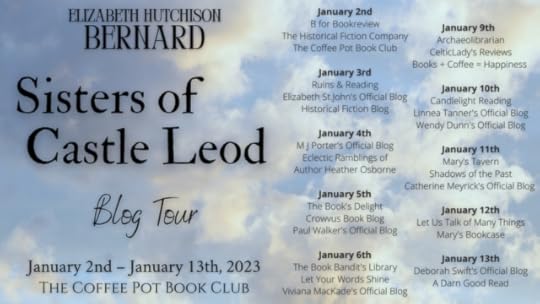
December 29, 2022
#HistFicThursdays - Horrible Histories 12 - We're History
It's been quite a year! I'm delighted to have shared a post with you all on every Thursday of 2022 on the theme of Historical Fiction. I've loved spreading the word about some of the fantastic historical writers (as in writers of history!), shared a few ideas of my own, and looked at a few of the Horrible Histories songs along the way. While #HistFicThursdays will be continuing into the new year, this will be my last Horrible Histories blog (but take a look at some of the other songs which I didn't get around to, as well, because they are brilliant, too!). And it had to be this one...
The great thing about historical fiction, is that it doesn't matter what period you want to write, each one of them offers something new to the world we live in today. Whether you're delving back into prehistory where this song starts, or just heading back to the World Wars where it finishes, there were major discoveries and personal stories along the way. With so much pull back into history, it's tricky to keep our feet firmly rooted in the 21st century. From my own writing, I've leapt through ten centuries in short stories and novels: a whole millennia. I'm as guilty as the next person for being swept away on the ideas of chivalry and heroic deeds - and these definitely happened - but there was a fair share of nastiness along the way too.
Finding that balance in writing and understanding history is so important. This song goes a little way to showing that. Whether it's the Romans building roads and slaughtering Christians, or the Renaissance of "progress in science and arts" whilst simultaneously burning and beheading people. But, depending on the genre your historical fiction takes place in, both things may appear in your writing.
And then there are those stories - or collections of stories - which span centuries. At the millennium (yes, I'm old enough to remember that!) my sister got a selection of children's stories featuring one from each century since that mystical Year Nought. I often think of that, and this song always make me think of it. What would it be to time-travel from that time to this, picking up on those groundbreaking and horrible moments, sharing in everything which came with them? Watching this song, it makes me want to emulate the spirit of that book, to write something which will tell those stories across all time. There's a new goal, then - something to keep me busy in the New Year!
Happy New Year, Readers and Writers, and may all your historical books feature great adventure with just enough "horrible" bits to keep it interesting!
December 24, 2022
24th December: Merry Christmas!!!
2. Putting on my weasel socks, which I only wear on Christmas Eve.
3. Clemency stepping up to take Orlando for his groomies because Ginny was so tired she slept in.
4. Hot chocolate and a breakfast at Tesco to start Christmas Eve.
5. Delivering Christmas cards around Wick - it was nostalgic to be in the town on Christmas Eve!
6. Orlando getting some "Me Time" at the dog groomer's. He is doing so well with the very full house, but it was nice for him to have a bit of quiet time.
7. A visit from a family of family friends! Catching up on recent news and reminiscing about old times.
8. Auri being so excited to share the 24 windows of her advent calendar with her granny.
9. Auri and Ailsa munching on Rudolph's carrots as a snack!
10. The first cheeky glass of sherry of the season.
11. Seeing a Christmas star - despite the fact it was cloudy! What a magical moment of Christmas Eve!
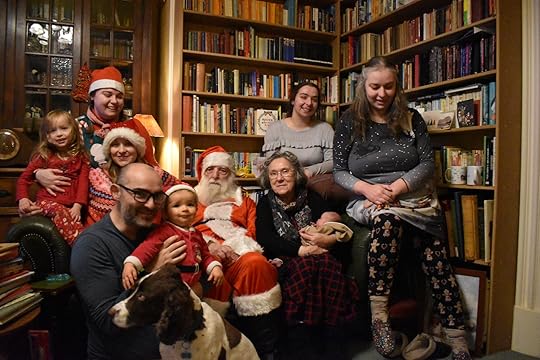 12. Pictures with Grandad Santa! Persuading Dad to dress up and then feeling very proud and grateful that he took part.
12. Pictures with Grandad Santa! Persuading Dad to dress up and then feeling very proud and grateful that he took part.13. Dad having his annual Christmas Eve chat with his younger brother, who lives 500 miles away.
14. A rich and delicious Yule Log, washed down with Irish Coffee... mmmm....
15. A great Christmas quiz, organised by Lydia, despite the fact she gave birth two weeks ago!
16. Discussing whose stocking is whose - and the absolute horror when Mum suggested that we just use any old stockings!
17. Auri and Ailsa throwing out some (ecologically-friendly) reindeer food.
18. Watching Santa on Norad's Santa Tracker.
19. Mum reading the Christmas story to Auri.
20. A two hour Baby Elfi cuddle for Auntie Ginny.
21. Some great moments of fun when we were playing the Don't Get Got! game. It's great to unleash our inner meanness!
22. Feeling a great sense of satisfaction when I managed to time all the pizzas for dinner.
23. Wrapping the little ones' presents from their great-granny.
24. Seeing the iced Christmas cake - Mum has made it look very elegant this year!
December 23, 2022
22nd December: The First Day of the Holidays
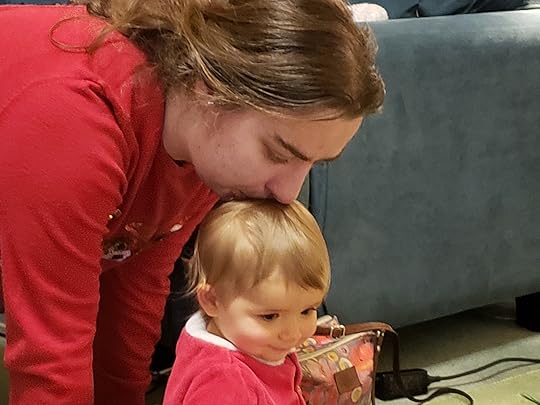
1. Orlando getting very concerned while Baby Ailsa was lying on the floor getting her snowsuit put on.
2. Watching our brother's family on their walk through the windfarm. They went to show Ailsa some sheep, and didn't know they were watching.
3. A very thoughtful and kind message from a friend.
4. A spontaneous hug on the morning dog walk - sometimes that can make anything in the world seem better.
5. Getting the travel cot out and cleaning it up, ready for the arrival of the Inverness family tomorrow!
6. Looking at pictures of our beautiful dogs with an eye to entering them in an online Christmas dog show.
7. Pay-day. That might sound a bit Scroogey but, at this time of year, it's very reassuring!
8. Finally getting my bedroom completely cleaned. Usually it doesn't take long, but this has been ages because of all the Christmas stuff!
9. Eating homegrown carrots, which were characteristically (or carrot-eristically!) delicious!
10. Knowing that, with the solstice passed, the days are now getting longer. The magic of winter is all around us, but so is the promise of spring!
11. Enjoying the Box of Delights advent calendar on Twitter.
12. Reading and feeding back on another brilliant story from a Globe Soup contributor.
13. Looking at pictures from when we got Jess (our little cocker spaniel) and admiring how well she is doing with her weight loss journey.
14. Ailsa waking up with some seriously fuzzy and gorgeous hair. Her parents both said they had never seen it like that, but it was so cute!
15. Receiving some really beautiful Christmas cards - they are mostly very traditional and stunning this year.
16. Mum reading Linnet's story from The Children of Green Knowe. It is the best of the stories!
17. Catching up with people who have supported Crowvus during 2022.
18. Ailsa being absolutely adamant that she wanted cuddles with Granny Susie. She's amazing at making herself understood.
19. Doing the Radio Times Christmas crossword together. We're doing ok so far...
20. Clemency snapping up pictures of the birds outside - her commentary was very amusing!
21. Giving Alex, Aurelie, and Ailsa the official tour of Stempster. They'd seen all the rooms already but they were very good at pretending!
22. Having a sneaky snowman sweetie to round off dinner. Well, it is Christmas!
Crowvus Book Blog
- Virginia Crow's profile
- 128 followers



